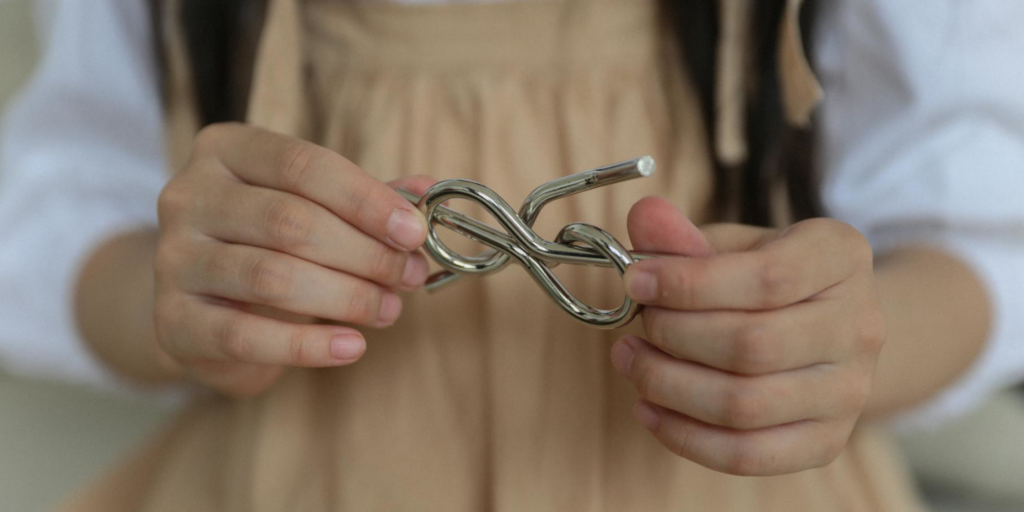Children with problem-solving skills are better equipped to set and achieve personal goals, resolve conflicts, and handle adversity effectively, which ultimately contributes to a more positive and fulfilling life.
No doubt, like me, you’ve watched your child struggle with the little things in life—like zipping up a jacket or tying their shoes for the first time. Do you remember their frustration, yet how determined they were to do it themselves? Are they still that determined, or has it become more of a, “Mom, Dad, I can’t do this. Come help me!”?
As kids get older, they seem to sometimes lose that willingness to spend time trying. This can be especially frustrating when they can’t find something important right as we’re walking out the door! Building problem-solving skills can help your child become more independent and determined, making them more likely to “stick with it” until they find the solution. One of the advantages of this is freeing up your bandwidth but actually the benefits for the child that has honed their problem solving abilities goes a lot further.
Problem-Solving Builds Independence
Each time a child solves a problem or overcomes a challenge it builds confidence. They become more self-reliant as they start to believe that they can do things for themselves. She becomes empowered to trust her own abilities and approaches new problems more logically knowing that the solution is there for her to find. This also reduces anxiety because problems become less overwhelming. Whether it’s figuring out a homework problem or resolving a disagreement with friends, having a foundation of problem solving will help them get through without immediately relying on help from others.
Problem-Solving Encourages Creativity and Critical Thinking
Solving problems forces us to think more creatively and critically. As girls practise problem solving they learn to look at challenges from multiple angles. Often to solve a problem we need to explore a number of different solutions, the right answer isn’t always right in front of us. By repeating the process of looking for alternative solutions girls learn to think outside of the box or take a more creative approach. Importantly they begin to understand that there is more than one path to finding the solution or success. This encourages them to be flexible or innovative which is important in both personal and academic growth. Critical thinking requires analysis of alternative solutions and thinking more logically. By practising these skills girls are better equipped to make more informed decisions in school, work and life.
Problem-Solving Strengthens Resilience
As already posited, solving a problem doesn’t usually take a direct root. This means to say that often the process of solving a problem requires failed attempts. These failed efforts teach young girls lessons in resilience. They begin to understand that setbacks and challenges are normal parts of life and that failure is not the end but rather a step closer to a solution. I love this quote by Edison and it’s a great reminder of how we should frame failure.
““I have not failed. I’ve just found 10,000 ways that won’t work.” – Thomas A. Edison
When girls see an opportunity to learn from failure they will become less afraid of challenges and more willing to take risks. This is essentially the foundation of a ‘growth mindset’ and it is essential for success in life and work. This is especially true when it comes to science and STEM in general where experimentation and failure are all part of the process.
Problem-Solving Prepares Her for Real-World Success
The usefulness of problem-solving skills stretches far beyond the classroom. An article on the LinkedIn Talent Blog cited problem solving as one of the top ten in demand skills for 2024. Irrespective of the industry or occupation, from doctors to business leaders, problem solving will help your daughter thrive in her career.
Problem solving abilities also play a role in conflict resolution and help navigate tricky social situations. Therefore problem solving skills can help your daughter have healthier friendships and more positive interactions as she grows.
Problem-Solving Fosters a Love of Learning
Solving a problem or figuring something out makes us feel proud and good about ourselves. These positive feelings make the process of finding a solution more enjoyable. With practice girls will begin to enjoy the challenge of the process and not just the end result. This brings about a natural curiosity, what can I figure out next. Whether its a rubik’s cube or a difficult maths problem, girls who enjoy the process of discovery are more engaged in education and develop that ‘growth mindset’. They have an ingrained belief that can continue to develop and expand.
Conclusion
Problem solving builds independence, creativity, resilience and prepares your daughter for success in both professional and personal life. It is the best skill you can give your daughter because it builds independence, creativity, resilience, and prepares her for real-world success. By encouraging her to tackle challenges, you’re equipping her with the tools she needs to navigate life with confidence and curiosity.
Try incorporating problem-solving activities into your daily routine and watch your daughter grow into a confident, capable problem-solver who’s ready to take on the world.
For other essential skills check out my blog post Top Ten Skills for Young GIrls
Fun activity
What can you do today to foster problem solving in your daughter?
Here is a great experiment you can do together as a problem solving exercise.
Egg Drop Challenge
Designing a parachute for an egg drop challenge, inspires creativity by requiring girls to consider different materials and designs to ensure a safe landing.These projects show that there is often more than one solution to a problem, allowing girls to explore various approaches and think creatively. By nurturing this mindset, we equip young girls with the flexibility and adaptability needed to tackle complex problems, both in STEM and in everyday life.
Gather an egg per contestant and set of household objects such as string, glue, plastic bags or anything else you can think of and challenge your daughter to create a parachute that will successfully land an egg without it breaking. In this challenge she will surely have to explore various approaches and think creatively but guaranteed to make you both laugh ( as long as you don’t mind the mess)
Opinion
What do you think, is problem solving just part of our nature? After all, we wouldn’t have gotten this far as a race without having solved a problem or two?






